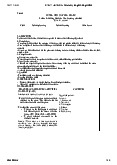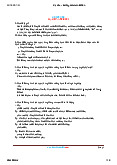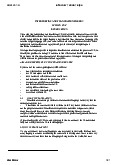
Preview text:
Piece 1: The world's economy is growing at a slightly slower pace than the IMF initial forecast in
January. But top financial officials gathered in Washington for the annual spring meetings face a
less threatening economic landscape, says IMF, managing director Christine Lagarde. But Lagar
adds the pickup in financial conditions in the us, Europe, and Japan has yet to translate into a
sustainable recovery in the Euro area. Policymakers have accomplished a great deal over a short
period of time. The priority now is to fix frayed banking systems, press ahead with banking
union in Japan, which as I said is, has a space of its own. The recently announced framework of
ambitious monetary easing is, from our point of view, a positive step, but it is not enough. On
Friday, finance ministers from 20 of the world's biggest economies endorsed Japan's efforts to
boost its stagnant economy. But the stimulus package enacted by by Japan's leaders also lowers
the value of the yen. In an official communique, G20 nations said they will monitor the effects of
Japan policies and take corrective action as needed. Much attention is focused on China, which
saw weaker than expected growth in the first quarter. The world's top financial policy makers
also are expected to look at the effectiveness of debt reduction policies. Some economists say
austerity measures, particularly those in Europe, have helped reduce the debt burden in some
countries at the expense of economic growth.
Piece 2: Two of the world's most powerful central bankers have taken the unprecedent step of
signalling their plans for future interest rate decision. Overnight, the Bank of England's Mark
Carney and the head of the European Central Bank, Mario Draghi, indicated rates will remain at
historic lows for some time. Governing Council expects the key, so all interest rate to remain, the
key ECB interest rates, to remain at present or lower levels for an extended period of time. The
rationale behind Mario Draghi's candle was clear, to help maintain the Eurozone's economic
recovery. Overall, Euro area economic activity should stabilise and recover in the course of the
year, albeit at subdue pace. The ECB's announcement was accompanied by a similar declaration
from across the English Channel. The Bank of England under the chairmanship of its new
Governor, Mark Cameron. The ECB's announcement was accompanied by a similar declaration
from the across the English channel. The Bank of England, under the chairmanship of its new
governor Mark Carney, said in a statement that it plan to keep its official rate at just half of one
per cent. And it's stated to maintain its £370 billion monetary stimulus from the investment firm.
2 most powerful central bankers were left little choice but to make their own intentions clear.
Matt Sherwood says openness in monetary policy comes with significant risks. The Reserve
Bank was raising interest rates in 2008 - the year of the global financial crisis, and if they had
kept providing future guidance saying yes, rates are going to go up and up and up.




